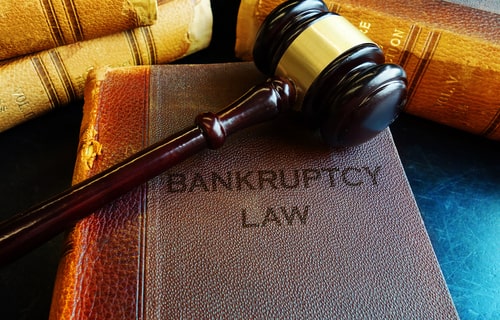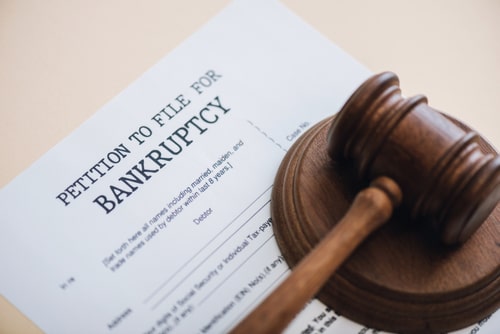Recent Blog Posts
What if the Creditor is Refusing to Show Validation of the Debt?
 When faced with overwhelming debt, many people look into bankruptcy as a means of obtaining a fresh financial start. However, before filing for bankruptcy, ensure that all debts are valid and accurately reported. If a creditor refuses to provide validation of a debt upon request, it can create a complex situation for the debtor. A Texas lawyer can help you explore the legal implications and potential courses of action when a creditor fails to confirm a debt under the law.
When faced with overwhelming debt, many people look into bankruptcy as a means of obtaining a fresh financial start. However, before filing for bankruptcy, ensure that all debts are valid and accurately reported. If a creditor refuses to provide validation of a debt upon request, it can create a complex situation for the debtor. A Texas lawyer can help you explore the legal implications and potential courses of action when a creditor fails to confirm a debt under the law.
What You Should First Know About Debt Validation
Debt validation is when a creditor proves that a debt is legitimate and belongs to the individual being pursued for payment. Under the Fair Debt Collection Practices Act (FDCPA), a federal law in Texas, consumers have the right to request debt validation from creditors or collectors within 30 days of being contacted about a debt. The creditor must then provide written verification of the debt, including the original creditor’s name, the amount owed, and proof that the debt belongs to the consumer.
Why You Should Always Ask for Validation of a Debt
 Dealing with debt can be a massive headache. You are probably all too familiar with the relentless calls from debt collectors demanding payment and using aggressive tactics to pressure you into paying up. It is an incredibly stressful situation that leaves many feeling overwhelmed and hopeless. A Texas lawyer can help you figure out what to do if you are in this situation.
Dealing with debt can be a massive headache. You are probably all too familiar with the relentless calls from debt collectors demanding payment and using aggressive tactics to pressure you into paying up. It is an incredibly stressful situation that leaves many feeling overwhelmed and hopeless. A Texas lawyer can help you figure out what to do if you are in this situation.
Know What You Are Paying
One of the primary reasons for requesting debt validation is to confirm the legitimacy and accuracy of the debt. Debt collectors may provide incomplete or misleading information, making it difficult to determine if the debt is valid. By requesting validation, you can receive documentation that proves the debt’s existence, the amount owed, and the creditor’s right to collect.
Prevent Paying Expired Debts
There is a statute of limitations on debt collection in Texas, which varies depending on the type of debt. For example, the statute of limitations is four years for credit card debt. You can dispute if a debt collector tries to collect on an expired debt. Requesting validation can help identify whether the debt is still legally collectible or the statute of limitations has passed.
How Bankruptcy Affects Your Tax Filings
 Filing for bankruptcy can have significant implications on your tax obligations. You must understand how bankruptcy impacts your tax filings to ensure compliance with state and federal tax laws. A Texas lawyer can help you learn how bankruptcy will affect your tax filings for your specific situation.
Filing for bankruptcy can have significant implications on your tax obligations. You must understand how bankruptcy impacts your tax filings to ensure compliance with state and federal tax laws. A Texas lawyer can help you learn how bankruptcy will affect your tax filings for your specific situation.
Income Tax Debt
In Texas, income tax debt may be dischargeable in bankruptcy, depending on specific criteria. Generally, income tax debt that meets the following conditions can be eliminated through bankruptcy:
- The debt relates to a tax return filed at least three years before the bankruptcy filing date
- The tax return was due at least two years before the bankruptcy filing, including extensions
- The tax assessment occurred at least 240 days before the bankruptcy filing
How to Navigate the Bankruptcy Means Test in Texas
 Are you considering filing for bankruptcy in Texas? If so, you will need to understand the bankruptcy means test and how it applies to your unique financial situation. The means test is crucial in determining whether you qualify for Chapter 7 bankruptcy or must file for Chapter 13 instead. A Texas lawyer can guide you through the process of the bankruptcy means test.
Are you considering filing for bankruptcy in Texas? If so, you will need to understand the bankruptcy means test and how it applies to your unique financial situation. The means test is crucial in determining whether you qualify for Chapter 7 bankruptcy or must file for Chapter 13 instead. A Texas lawyer can guide you through the process of the bankruptcy means test.
The Purpose of the Means Test
The bankruptcy means test was introduced as part of the Bankruptcy Abuse Prevention and Consumer Protection Act of 2005. Its primary purpose is to prevent individuals with higher incomes from filing for Chapter 7 bankruptcy, which allows for the discharge of most unsecured debts. Instead, these individuals may be required to file for Chapter 13 bankruptcy, which involves a repayment plan lasting three to five years.
Step 1: Determine Your Average Monthly Income
To begin the means test, calculate your average monthly income for the six months prior to filing for bankruptcy. Include all sources of income, such as wages, salaries, bonuses, commissions, and any other regular income you receive. If you are married and filing jointly, include your spouse’s income as well.
Common Mistakes Before Filing for Bankruptcy in Texas
 Filing for bankruptcy can be a long, drawn-out process, especially if you are unfamiliar with the ins and outs of Texas law. It is easy to make mistakes that could otherwise be avoided with the right information and guidance. Having a Texas lawyer on your side can make a significant difference. There are too many mistakes that can be made easily.
Filing for bankruptcy can be a long, drawn-out process, especially if you are unfamiliar with the ins and outs of Texas law. It is easy to make mistakes that could otherwise be avoided with the right information and guidance. Having a Texas lawyer on your side can make a significant difference. There are too many mistakes that can be made easily.
Mistake #1: Not Understanding the Different Types of Bankruptcy
In Texas, individuals primarily opt for two types of bankruptcy: Chapter 7 and Chapter 13. Chapter 7, also known as "liquidation" bankruptcy, involves selling non-exempt assets to settle debts. Chapter 13 bankruptcy, alternatively, is a type of "reorganization" bankruptcy designed to let you retain your assets while you pay down your debts over a period of three to five years. Understanding the differences between the two types of bankruptcy is crucial to determining which suits your situation.
Does Divorce Affect Bankruptcy in Texas?
 Divorce and bankruptcy are two of life’s most challenging experiences, and they often go hand in hand. If you are considering filing for bankruptcy and are also going through a divorce, it is essential to understand how these two legal processes can impact each other. A Texas lawyer can help you determine how you could be affected in your specific situation.
Divorce and bankruptcy are two of life’s most challenging experiences, and they often go hand in hand. If you are considering filing for bankruptcy and are also going through a divorce, it is essential to understand how these two legal processes can impact each other. A Texas lawyer can help you determine how you could be affected in your specific situation.
The Timing of Your Bankruptcy Filing Matters
If you file for bankruptcy before your divorce is finalized, your bankruptcy case will include all of your marital assets and debts. This means that any property you and your spouse own together and any joint debts will be subject to bankruptcy proceedings.
On the other hand, if you wait until after your divorce is finalized to file for bankruptcy, only your assets and debts will be included in the bankruptcy case. This can be advantageous if you want to protect certain assets or have significant individual debt you wish to discharge through bankruptcy.
How Can Real Estate Defense Help Foreclosure?
 Finding yourself facing foreclosure is a stressful situation with uncertainty around the next steps. However, working with a Texas real estate attorney early on opens doors that struggling homeowners may not realize are there. With compassionate and strategic legal representation in your corner guiding the process, you can discover alternatives that can help defend your property from forfeiture.
Finding yourself facing foreclosure is a stressful situation with uncertainty around the next steps. However, working with a Texas real estate attorney early on opens doors that struggling homeowners may not realize are there. With compassionate and strategic legal representation in your corner guiding the process, you can discover alternatives that can help defend your property from forfeiture.
Respond Within Statutory Timeframes
Time is vital when responding to a foreclosure lawsuit. Texas law provides strict statutory deadlines for answering once served with a foreclosure petition. It is crucial to file the proper response on time. Missing the deadline to respond can result in an immediate default judgment against the homeowner, making foreclosure inevitable. Proper legal representation can prevent homeowners from inadvertently giving up their rights.
What to Expect After Bankruptcy
 Filing for bankruptcy can provide much-needed relief if you are overwhelmed with debt. However, it also brings significant changes to your financial life. It is ideal to know what to expect, and a Texas bankruptcy attorney can help you determine what life may be like in your specific situation.
Filing for bankruptcy can provide much-needed relief if you are overwhelmed with debt. However, it also brings significant changes to your financial life. It is ideal to know what to expect, and a Texas bankruptcy attorney can help you determine what life may be like in your specific situation.
The Immediate Aftermath
Once your bankruptcy is discharged, the calls and letters from creditors should stop almost immediately. The discharge order from the bankruptcy court prevents creditors from trying to collect on discharged debts. However, the discharge does not get rid of all debts. You are still responsible for domestic support obligations, some taxes, student loans, and any fraud-related debts. Creditors can resume collection activities if these debts are excluded from the bankruptcy. Within 30 days of the discharge, you will receive a notice outlining which debts, if any, were not wiped out by the bankruptcy. You will also get information about any property the bankruptcy trustee abandoned back to you.
What Is Chapter 13 Bankruptcy and How Does It Impact Tax Debt?
 Chapter 13 bankruptcy allows you to restructure your debts into a three to five-year payment plan approved by the bankruptcy court. This type of bankruptcy is often called “wage earner’s bankruptcy” because it is only available to individuals with regular income. The payment plan allows you to catch up on missed payments to creditors while also paying down a portion of your debts under court protection. Your assets are not liquidated like in a Chapter 7 bankruptcy. At the end of your payment plan, eligible debts are discharged. A Texas bankruptcy lawyer can help you navigate this out for your specific situation.
Chapter 13 bankruptcy allows you to restructure your debts into a three to five-year payment plan approved by the bankruptcy court. This type of bankruptcy is often called “wage earner’s bankruptcy” because it is only available to individuals with regular income. The payment plan allows you to catch up on missed payments to creditors while also paying down a portion of your debts under court protection. Your assets are not liquidated like in a Chapter 7 bankruptcy. At the end of your payment plan, eligible debts are discharged. A Texas bankruptcy lawyer can help you navigate this out for your specific situation.
How Tax Debt is Treated in Chapter 13
Most tax debt can be included in your Chapter 13 payment plan. There are a few exceptions for recent tax liability and tax debt from filing fraudulent returns. Generally, Chapter 13 allows you to catch up on federal income tax, self-employment tax, payroll withholding tax, and other types of tax debt across multiple years. Your proposed payment plan must pay these tax debts in full over three to five years to obtain discharge eligibility. If you have not filed tax returns for previous years, you will likely have to file before your Chapter 13 case is approved.
When Should You Seek Loan Modification?
 Facing unmanageable mortgage payments leaves struggling homeowners weighing options. Attempting mortgage loan modification merits consideration for lowering payments to affordable levels long-term through adjusted interest rates, extended repayment terms, or reduced principal. Working with a Texas bankruptcy lawyer when modification makes the most strategic sense helps navigate the process proactively.
Facing unmanageable mortgage payments leaves struggling homeowners weighing options. Attempting mortgage loan modification merits consideration for lowering payments to affordable levels long-term through adjusted interest rates, extended repayment terms, or reduced principal. Working with a Texas bankruptcy lawyer when modification makes the most strategic sense helps navigate the process proactively.
If You Have Missed Several Payments
Consistently falling behind on mortgage payments triggers late fees and credit score damage and brings you closer to potential foreclosure over time. Even just a few missed payments can quickly snowball out of control as penalties and arrears amount.
Seeking loan modification early into delinquency makes strategic sense before amounts owed become an insurmountable obstacle to catching up. Most servicers must mandatorily evaluate homeowners for “hardship” assistance changes once two payments get missed, so filing paperwork around the third late payment mark maximizes responsiveness.









